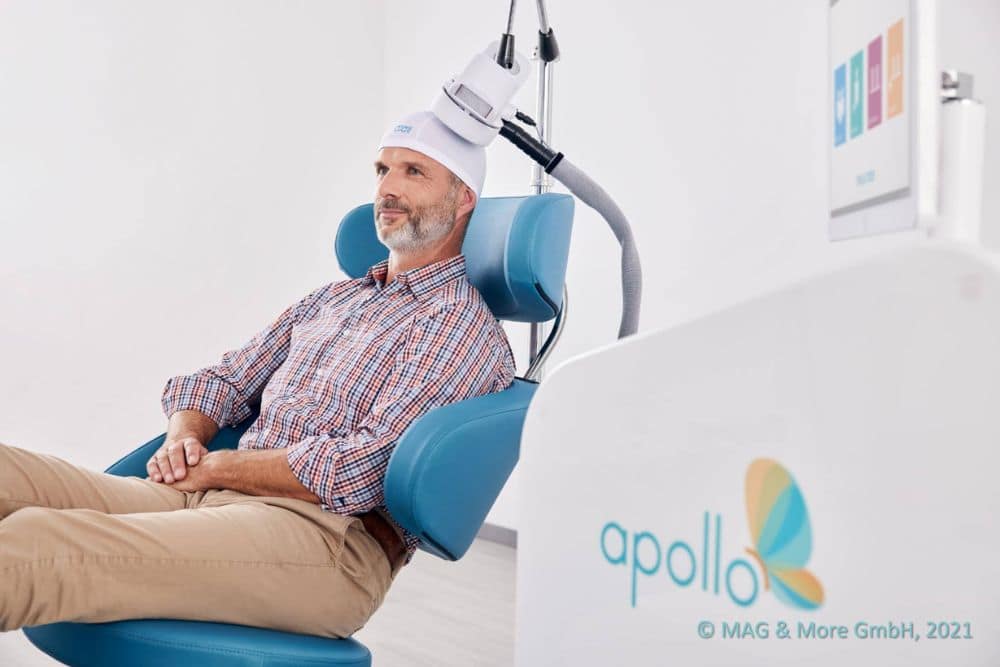Transcranial Magnetic Stimulation (TMS) Therapy in Mental Health Care
You’ve tried multiple medications. You’ve given therapy your best effort. You’ve done everything your doctors recommended, and yet you’re still struggling. Maybe it’s the heavy weight of depression, the intrusive thoughts of OCD, or the anxiety that keeps you on edge. If traditional treatments haven’t worked, you might be wondering if there are any options left.
There is. Transcranial Magnetic Stimulation (TMS) is an FDA-approved, non-invasive treatment that’s helping people with treatment-resistant depression, OCD, anxiety disorders, and PTSD find relief when traditional treatments haven’t worked. It’s not experimental, it doesn’t require surgery or anesthesia, and it has far fewer side effects than most medications.
If you’ve been stuck in the cycle of trying treatment after treatment without real improvement, TMS might be the breakthrough you’ve been looking for.

What Is Transcranial Magnetic Stimulation Therapy?
TMS is a form of brain stimulation that uses magnetic fields to activate specific areas of the brain involved in mood regulation, anxiety, and other mental health conditions. Think of it as a way to directly target the parts of your brain that aren’t functioning properly, without affecting your entire body the way medication does.
During TMS treatment, an electromagnetic coil is placed against your scalp. This coil delivers focused magnetic pulses to specific brain regions, most commonly the prefrontal cortex. These magnetic pulses are similar in strength to an MRI scan, and they work by stimulating nerve cells in regions that control mood, anxiety responses, and other symptoms.
The treatment is completely non-invasive. There are no needles, no surgery, no anesthesia. You remain fully awake and alert during each session, which typically lasts about 20-40 minutes. Most people can read, listen to music, or simply relax during treatment.

How Does TMS Work?
Mental health conditions aren’t just psychological; they often involve biological changes in how your brain functions. For example, research shows that in people with depression, the prefrontal cortex often has reduced activity, which affects their ability to regulate mood, motivation, and emotional responses.
TMS works by delivering targeted magnetic pulses that stimulate these affected brain regions. Here’s what happens:
- Magnetic pulses activate neurons: The electromagnetic coil generates a magnetic field that passes through your skull and reaches the prefrontal cortex. This magnetic field causes electrical currents in your brain tissue, which activates neurons in that specific area.
- Neural pathways are strengthened: With repeated sessions, TMS helps “retrain” neural pathways and promotes neuroplasticity, essentially helping your brain develop healthier communication patterns between regions involved in mood regulation.
- Natural brain chemistry improves: Unlike medications that introduce chemicals into your entire system, TMS stimulates your brain to naturally release its own mood-regulating neurotransmitters. This targeted approach means you get the therapeutic benefits without the systemic side effects common with antidepressants and other psychiatric medications.
- Long-term changes develop over time: While one session can change brain excitability, the full therapeutic effect builds gradually. Most people begin noticing improvements within the first few treatments, with continued benefits developing throughout the full treatment course.
TMS Boosts Brain Activity
SPECT scan imaging reveals how TMS directly targets specific brain circuits involved in mood regulation. The red-orange areas in these scans show increased blood flow in the brain as a direct result of TMS treatment.

Who Is TMS For?
TMS is specifically designed for people who haven’t found adequate relief with traditional treatments. While it’s most commonly used for treatment-resistant depression, it’s also FDA-cleared for several other mental health conditions.
You might be a good candidate for TMS if:
- You’ve tried multiple medications for depression, anxiety, OCD, or PTSD without significant improvement
- Medication side effects have been intolerable or interfere with your quality of life
- You’re unable to take psychiatric medications due to other health conditions
- You want to avoid or reduce psychiatric medications
- Your symptoms are significantly affecting your ability to function in daily life
- You’ve engaged in therapy but still struggle with persistent symptoms
TMS is used for:
- Treatment-resistant depression (most established use)
- Obsessive-compulsive disorder (OCD)
- Anxiety disorders, including generalized anxiety disorder (GAD)
- Migraine prevention and chronic pain conditions
- Post-traumatic stress disorder (PTSD)
- Comorbid conditions (depression with anxiety, for example)
Finding Hope When Other Treatments Haven’t Worked
Living with treatment-resistant mental health conditions can feel hopeless. But treatment-resistant doesn’t mean untreatable. It just means the treatments you’ve tried so far haven’t been the right fit for your specific brain and situation. TMS represents a fundamentally different approach, one that directly targets the biological mechanisms of your condition in a way that medication and therapy alone cannot.
You deserve to feel better. You deserve a treatment that actually works. And you deserve to have all your options on the table, not just the ones you’ve already tried.
TMS Therapy in Colorado: Exploring Your Options at Mile High Psychiatry
At Mile High Psychiatry, we understand the frustration and exhaustion that comes with treatment-resistant mental health conditions. We know that by the time you’re considering TMS, you’ve likely been struggling for a long time and tried multiple approaches that haven’t brought the relief you need.
Our experienced team of mental health providers stays current on the latest evidence-based treatments, including innovative options like TMS therapy. We take time to understand your unique history, assess whether TMS might be a good fit for your situation, and work with you to create a comprehensive treatment plan that addresses all aspects of your mental health.
Living in Colorado’s high-altitude environment can present unique challenges for mental health, from seasonal depression intensified by long winters to the stress of navigating life in a rapidly growing state. Whether you’re dealing with treatment-resistant depression, OCD, anxiety, PTSD, or other mental health conditions, we’re here to support you with personalized, evidence-based care.
Request a consultation with Mile High Psychiatry today to discuss whether TMS therapy or other treatment options could help you finally find relief.


